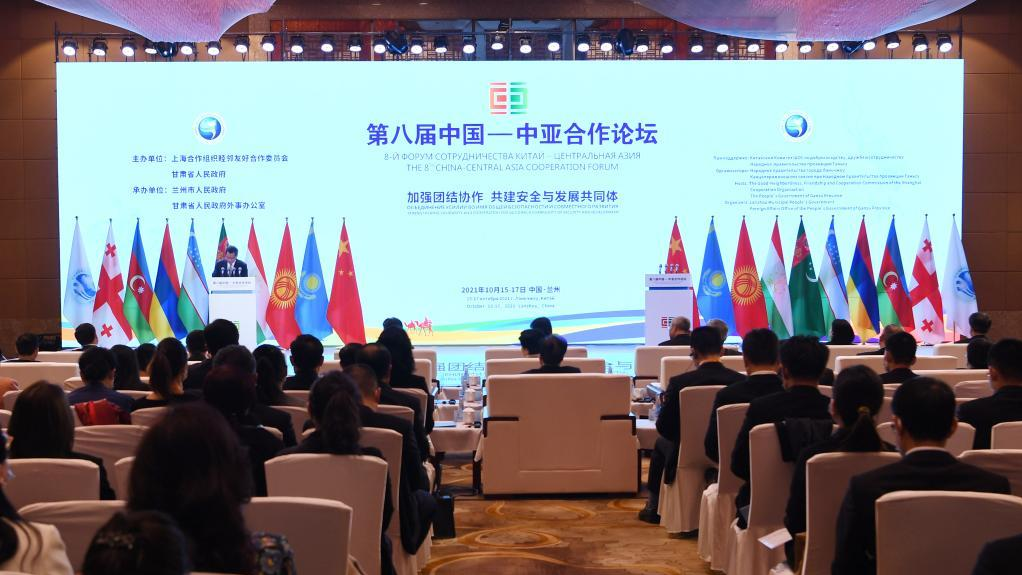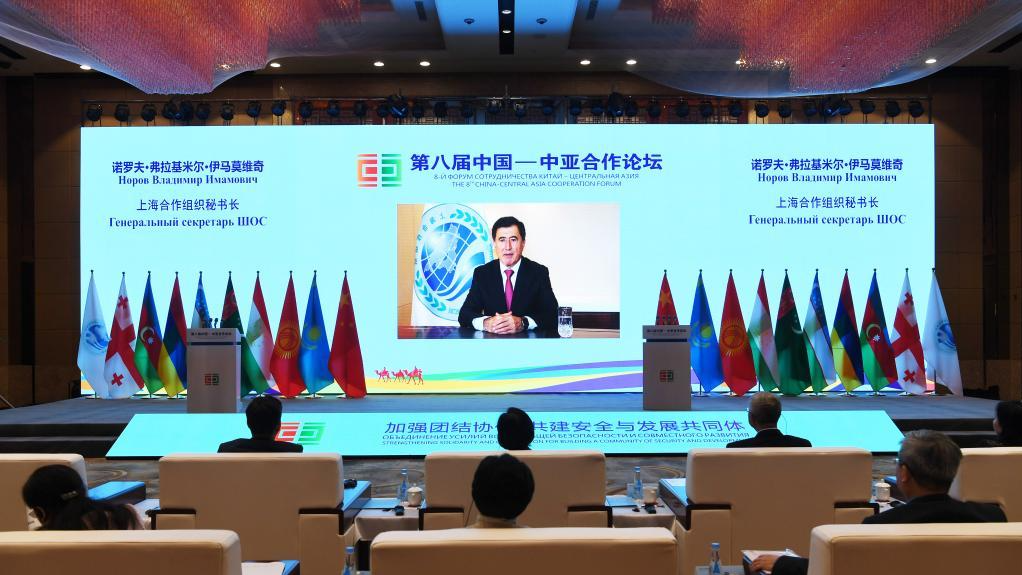
The opening ceremony of the 8th China-Central Asia Cooperation Forum in Lanzhou, capital of northwest China's Gansu Province, October 16, 2021. /Xinhua
The opening ceremony of the 8th China-Central Asia Cooperation Forum in Lanzhou, capital of northwest China's Gansu Province, October 16, 2021. /Xinhua
Editor's note: Hamzah Rifaat Hussain, a former visiting fellow at the Stimson Center in Washington and former assistant researcher at the Islamabad Policy Research Institute, is a TV anchor at Indus News in Pakistan. The article reflects the author's opinions and not necessarily the views of CGTN.
The 8th China-Central Asia Cooperation Forum concluded on a focused, practical and positive note with shared visions of a more connected, inclusive and climate-friendly destiny among all member states.
Hosted in Lanzhou in northwest China's Gansu Province, a joint initiative among representatives from Kazakhstan, Tajikistan, Kyrgyzstan, Turkmenistan, Uzbekistan and China is planned, which bodes well for Central Asian connectivity for a shared and prosperous destiny.
The multifaceted nature of the cooperation forum is a reflection of the unconditional bilateral relationships that China shares with each of the Central Asian states and vice versa.
The overarching theme was to "Strengthen Solidarity and Cooperation for Building a Community of Security and Development," which was complemented with sub-forums covering subjects that are often sidelined or underreported in Western media outlets, such as green development strategies and China's Beidou Navigation Satellite System (BDS), which has received great approbation from Central Asian states.
Also, the regional relationship has too often been viewed from a limited understanding of trading ties, when in truth, this forum and the joint understandings reached hitherto demonstrate a more multipronged partnership.
A themed exhibition showcasing BDS products, which are employed in logistics, agriculture and tourism, was followed with a resolve to swiftly complete the China-Kyrgyzstan-Uzbekistan highway, and the operations of the crude oil pipelines between Kazakhstan and China. All of this contributes to joint prosperity.
Amiable ties between respective leaderships of member states will usher in greater understanding.

Vladimir Imamovich Norov, secretary-general of the Shanghai Cooperation Organization (SCO), speaks via video link during the opening ceremony of the 8th China-Central Asia Cooperation Forum in Lanzhou, capital of northwest China's Gansu Province, October 16, 2021. /Xinhua
Vladimir Imamovich Norov, secretary-general of the Shanghai Cooperation Organization (SCO), speaks via video link during the opening ceremony of the 8th China-Central Asia Cooperation Forum in Lanzhou, capital of northwest China's Gansu Province, October 16, 2021. /Xinhua
Hosted by the Good-Neighborliness, Friendship and Cooperation Committee of the Shanghai Cooperation Organization (SCO), Secretary-General of the SCO Vladimir Norov reminded states as well as the international community how the platform provides opportunities for political interactions between respective leaderships to take place.
2021 presents a different set of global challenges that have increased both in scope and magnitude, for which Central Asia is no exception.
Alikhan Smailov, the first deputy prime minister of Kazakhstan, mentioned how the 2021 forum has generated a consensus on prioritizing health sector cooperation between all states and the importance of continuity in the provision of unconditional medical investments between China and Central Asian states to cope with the pandemic. Environmental protection, which is an unwavering commitment to tackle climate change, is at the top of the agenda.
Note further that active participation by member states is also strategic, not transactional, given that a global agenda for sustainable development until the year 2030 has been previously mulled over alongside a joint resolve toward achieving carbon neutrality by the year 2060.
The unanimity of visions has meant that there will be concerted efforts in achieving set targets that are well defined in a region that has witnessed severe turmoil in neighboring Afghanistan for over 20 years as well as the rise of transnational challenges that have an impact on localized sustainable development in each country.
The collective resolve expressed in tackling regional challenges emphasizes the broader point that all member states wish to achieve apolitical cooperation, which contributes to peace in the region.
Many myths have also been put to rest. The remarks of Tajik Ambassador to China Saidzoda Zohir at the forum dispelled the notion that the Belt and Road Initiative (BRI) will prove to be a burden on recipient countries, which also discards variables such as clean environments and utilization of renewable energy which are an integral part of the BRI.
By pointing out global challenges and the importance of a growing Chinese economy in countering them, Zohir said that Beijing's contribution is integral to the joint construction of a healthy, green and digital silk road.
Now, the year 2021 is considered to be the launching pad for further diversification and greener growth strategies while not compromising on gains made from extensive trading ties by member states. For two decades, the volume of trade between China and Central Asian states grew in the absence of any disputes with the cumulative amount of investments from China to each of the five countries totaling $15 billion in 2020 alone.
Hence, these understandings come at a crucial time and are a testament to a collective resolve of tackling common challenges through investments and infrastructural development. Both China and Central Asian states are striving toward a more prosperous future.
(If you want to contribute and have specific expertise, please contact us at opinions@cgtn.com.)

